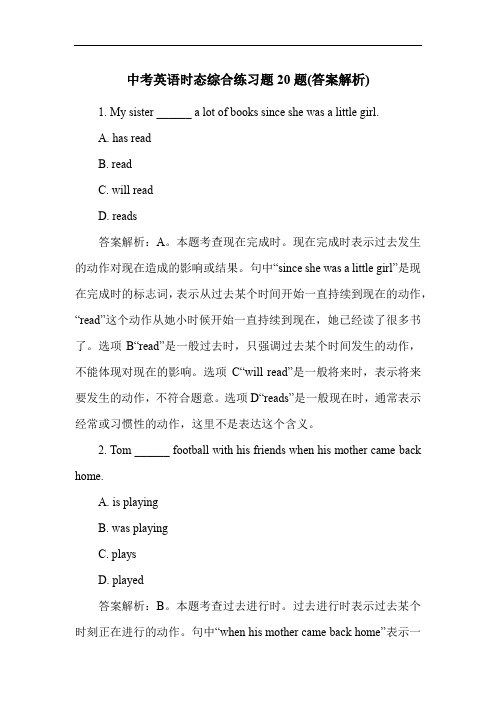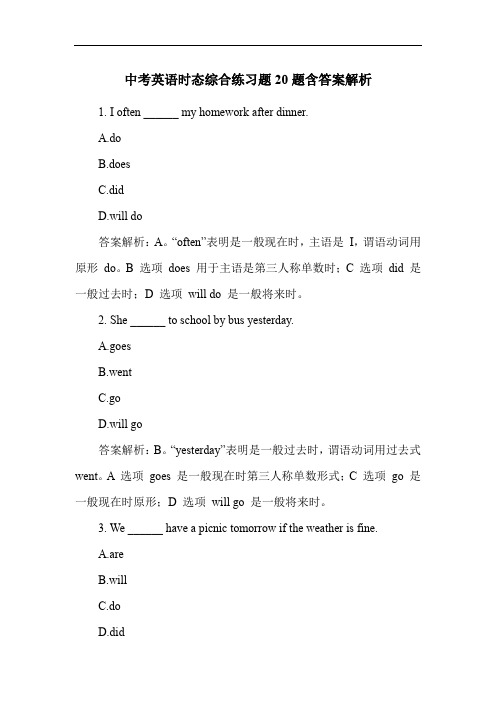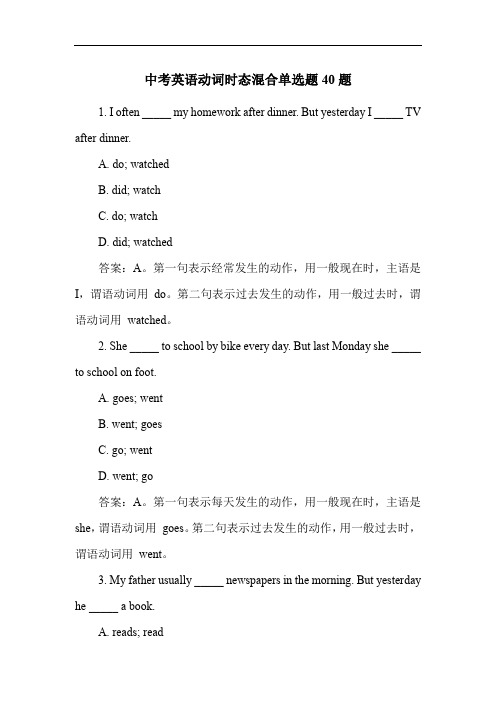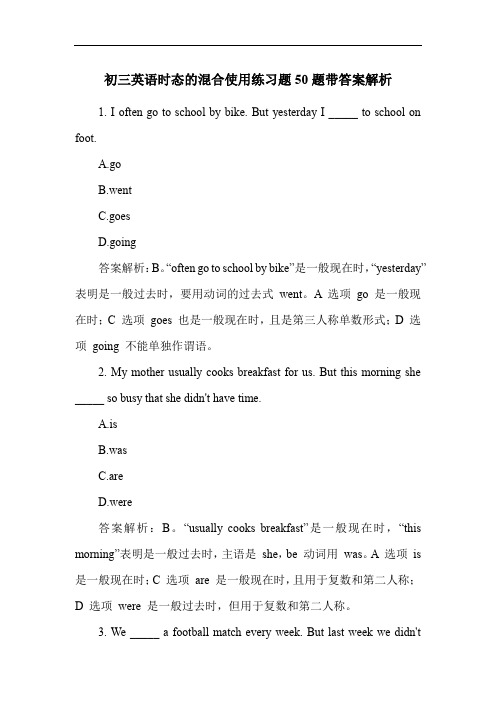初中英语中考各种时态混合训练
中考英语时态综合练习题20题(答案解析)

中考英语时态综合练习题20题(答案解析)1. My sister ______ a lot of books since she was a little girl.A. has readB. readC. will readD. reads答案解析:A。
本题考查现在完成时。
现在完成时表示过去发生的动作对现在造成的影响或结果。
句中“since she was a little girl”是现在完成时的标志词,表示从过去某个时间开始一直持续到现在的动作,“read”这个动作从她小时候开始一直持续到现在,她已经读了很多书了。
选项B“read”是一般过去时,只强调过去某个时间发生的动作,不能体现对现在的影响。
选项C“will read”是一般将来时,表示将来要发生的动作,不符合题意。
选项D“reads”是一般现在时,通常表示经常或习惯性的动作,这里不是表达这个含义。
2. Tom ______ football with his friends when his mother came back home.A. is playingB. was playingC. playsD. played答案解析:B。
本题考查过去进行时。
过去进行时表示过去某个时刻正在进行的动作。
句中“when his mother came back home”表示一个过去的时间点,在这个时间点上,Tom正在和他的朋友踢足球,所以用过去进行时。
选项A“is playing”是现在进行时,用于现在正在进行的动作,不符合题意。
选项C“plays”是一般现在时,强调经常或习惯性动作,不适合这里。
选项D“played”是一般过去时,只表示过去发生了某个动作,不能体现当时正在进行的状态。
3. We ______ to the park if it doesn't rain tomorrow.A. goB. wentC. will goD. have gone答案解析:C。
中考英语时态综合练习题20题含答案解析

中考英语时态综合练习题20题含答案解析1. I often ______ my homework after dinner.A.doB.doesC.didD.will do答案解析:A。
“often”表明是一般现在时,主语是I,谓语动词用原形do。
B 选项does 用于主语是第三人称单数时;C 选项did 是一般过去时;D 选项will do 是一般将来时。
2. She ______ to school by bus yesterday.A.goesB.wentC.goD.will go答案解析:B。
“yesterday”表明是一般过去时,谓语动词用过去式went。
A 选项goes 是一般现在时第三人称单数形式;C 选项go 是一般现在时原形;D 选项will go 是一般将来时。
3. We ______ have a picnic tomorrow if the weather is fine.A.areB.willC.doD.did答案解析:B。
“tomorrow”表明是一般将来时,用will+动词原形。
A 选项are 后面不能直接跟动词原形have;C 选项do 用于一般现在时;D 选项did 用于一般过去时。
4. My father usually ______ newspapers in the morning.A.readB.readsC.is readingD.will read答案解析:B。
“usually”表明是一般现在时,主语是my father 第三人称单数,谓语动词用reads。
A 选项read 是原形;C 选项is reading 是现在进行时;D 选项will read 是一般将来时。
5. I ______ to the park last Sunday.A.goB.wentC.will goD.am going答案解析:B。
“last Sunday”表明是一般过去时,谓语动词用过去式went。
中考英语时态综合运用练习题40题含答案解析

中考英语时态综合运用练习题40题含答案解析1.She often ______ books in the library.A.readB.readsC.is readingD.was reading答案解析:B。
本题考查一般现在时。
主语是she,谓语动词要用第三人称单数形式reads。
A 选项read 是动词原形;C 选项is reading 是现在进行时;D 选项was reading 是过去进行时。
2.I ______ to school by bike yesterday.A.goB.wentC.goesD.am going答案解析:B。
本题考查一般过去时。
yesterday 是一般过去时的标志词,所以要用went。
A 选项go 是一般现在时;C 选项goes 是一般现在时第三人称单数形式;D 选项am going 是现在进行时表将来。
3.He usually ______ football after school.A.playB.playsC.is playingD.played答案解析:B。
本题考查一般现在时。
usually 是一般现在时的标志词,主语是he,谓语动词要用第三人称单数形式plays。
A 选项play 是动词原形;C 选项is playing 是现在进行时;D 选项played 是一般过去时。
4.They ______ a picnic last weekend.A.haveB.hadC.hasD.is having答案解析:B。
本题考查一般过去时。
last weekend 是一般过去时的标志词,所以要用had。
A 选项have 是一般现在时;C 选项has 是一般现在时第三人称单数形式;D 选项is having 是现在进行时。
5.My mother ______ breakfast for me every day.A.makeB.makesC.is makingD.made答案解析:B。
中考英语时态综合运用练习题40题(带答案)

中考英语时态综合运用练习题40题(带答案)1. My sister ______ to school by bike every day, but yesterday she ______ to school by bus because her bike was broken.A. goes wentB. went goesC. is going wentD. goes is going答案解析:A。
第一空,根据“every day”可知是一般现在时,主语“my sister”是第三人称单数,所以动词用“goes”。
第二空,根据“yesterday”可知是一般过去时,所以动词用“went”。
B选项时态顺序错误;C选项第一空“is going”是现在进行时,不符合题意;D选项第二空“is going”是现在进行时,也不符合题意。
2. There ______ a football match in our school next week.A. will haveB. is going to haveC. will beD. is答案解析:C。
本题考查一般将来时。
“there be”句型的一般将来时结构是“there will be”或者“there is/are going to be”。
A和B选项中“have”与“there be”句型冲突;D选项“is”是一般现在时,不符合“next week”表示的将来时间。
3. I ______ my homework when my mother came back homeyesterday.A. doB. was doingC. didD. am doing答案解析:B。
根据“when my mother came back home yesterday”可知,当妈妈昨天回家这个瞬间动作发生时,“我”正在做家庭作业,是过去进行时。
A选项“do”是一般现在时;C选项“did”是一般过去时,不能表达当时正在进行的动作;D选项“am doing”是现在进行时,时间不符。
初三英语时态的混合使用练习题50题含答案解析

初三英语时态的混合使用练习题50题含答案解析1.She often ______ to school by bike, but yesterday she ______ to school on foot.A.goes; wentB.go; wentC.goes; goD.go; go答案解析:A。
第一空,often 表明是一般现在时,主语she 是第三人称单数,所以用goes。
第二空,yesterday 表明是一般过去时,用went。
2.The boys ______ football on the playground now.A.playB.playsC.are playingD.is playing答案解析:C。
now 表明是现在进行时,主语the boys 是复数,所以用are playing。
3.I ______ my homework last night.A.doB.doesC.didD.doing答案解析:C。
last night 表明是一般过去时,所以用did。
4.My mother usually ______ breakfast for us.A.cookB.cooksC.cookingD.is cooking答案解析:B。
usually 表明是一般现在时,主语my mother 是第三人称单数,所以用cooks。
5.They ______ a picnic last Sunday.A.haveB.hasC.hadD.having答案解析:C。
last Sunday 表明是一般过去时,所以用had。
6.Look! The girls ______ in the classroom.A.singB.singsC.are singingD.is singing答案解析:C。
Look!表明是现在进行时,主语the girls 是复数,所以用are singing。
7.He ______ TV every evening.B.watchesC.watchingD.is watching答案解析:B。
中考英语时态综合练习题30题(带答案)

中考英语时态综合练习题30题(带答案)1. My mother ______ breakfast for me every morning.A. makeB. makesC. madeD. will make答案解析:B。
根据句中的every morning可知这是一个经常发生的动作,所以要用一般现在时。
主语my mother是第三人称单数,动词要用第三人称单数形式makes。
选项A不是第三人称单数形式;选项C是一般过去时,用于过去发生的动作;选项D是一般将来时,用于将来发生的动作,均不符合题意。
2. They ______ a football game last Sunday.A. playB. playsC. playedD. will play答案解析:C。
句中的last Sunday表明这是一个发生在过去的动作,所以要用一般过去时,play的过去式是played。
选项A是一般现在时;选项B是一般现在时第三人称单数形式;选项D是一般将来时,都不符合此句的时态要求。
3. I ______ to the park tomorrow.A. goB. wentC. goesD. will go答案解析:D。
句中的tomorrow表示将来的时间,所以要用一般将来时,其结构是will+动词原形,所以答案是will go。
选项A是一般现在时;选项B是一般过去时;选项C是一般现在时第三人称单数形式,均不符合题意。
4. He ______ his homework every day.A. doB. doesC. didD. will do答案解析:B。
every day表示每天,是一般现在时的标志。
主语he是第三人称单数,动词要用第三人称单数形式does。
选项A不是第三人称单数形式;选项C是一般过去时;选项D是一般将来时,不符合要求。
5. She ______ a book yesterday.A. readB. readsC. will readD. is reading答案解析:A。
中考英语动词时态混合练习题40题

中考英语动词时态混合单选题40题1. I often _____ my homework after dinner. But yesterday I _____ TV after dinner.A. do; watchedB. did; watchC. do; watchD. did; watched答案:A。
第一句表示经常发生的动作,用一般现在时,主语是I,谓语动词用do。
第二句表示过去发生的动作,用一般过去时,谓语动词用watched。
2. She _____ to school by bike every day. But last Monday she _____ to school on foot.A. goes; wentB. went; goesC. go; wentD. went; go答案:A。
第一句表示每天发生的动作,用一般现在时,主语是she,谓语动词用goes。
第二句表示过去发生的动作,用一般过去时,谓语动词用went。
3. My father usually _____ newspapers in the morning. But yesterday he _____ a book.A. reads; readB. read; readsC. read; readedD. reads; reads答案:A。
第一句表示通常发生的动作,用一般现在时,主语是my father,谓语动词用reads。
第二句表示过去发生的动作,read 的过去式还是read。
4. We _____ English classes on Monday and Wednesday. But last week we _____ an English test on Monday.A. have; hadB. had; haveC. have; haveD. had; had答案:A。
第一句表示每周一和周三发生的动作,用一般现在时,主语是we,谓语动词用have。
初三英语时态的混合使用练习题50题带答案解析

初三英语时态的混合使用练习题50题带答案解析1. I often go to school by bike. But yesterday I _____ to school on foot.A.goB.wentC.goesD.going答案解析:B。
“often go to school by bike”是一般现在时,“yesterday”表明是一般过去时,要用动词的过去式went。
A 选项go 是一般现在时;C 选项goes 也是一般现在时,且是第三人称单数形式;D 选项going 不能单独作谓语。
2. My mother usually cooks breakfast for us. But this morning she _____ so busy that she didn't have time.A.isB.wasC.areD.were答案解析:B。
“usually cooks breakfast”是一般现在时,“this morning”表明是一般过去时,主语是she,be 动词用was。
A 选项is 是一般现在时;C 选项are 是一般现在时,且用于复数和第二人称;D 选项were 是一般过去时,但用于复数和第二人称。
3. We _____ a football match every week. But last week we didn'tbecause of the bad weather.A.haveB.hadC.hasD.having答案解析:A。
“every week”表明是一般现在时,主语是we,用动词原形have。
B 选项had 是一般过去时;C 选项has 是一般现在时,且用于第三人称单数;D 选项having 不能单独作谓语。
4. My father _____ to work by car every day. But yesterday he took the bus.A.goB.wentC.goesD.going答案解析:C。
- 1、下载文档前请自行甄别文档内容的完整性,平台不提供额外的编辑、内容补充、找答案等附加服务。
- 2、"仅部分预览"的文档,不可在线预览部分如存在完整性等问题,可反馈申请退款(可完整预览的文档不适用该条件!)。
- 3、如文档侵犯您的权益,请联系客服反馈,我们会尽快为您处理(人工客服工作时间:9:00-18:30)。
初中英语各种时态混合训练1. _______ you _________ (mind) my turning off the radio?2. She ____________ (not do) well in chemistry.3. There ___________ (be) a map and some pictures on the desk.4. Who __________ (own) such a tall building? Mr. King does.5. Don’t worry! It __________ (take) us half an hour to fix the machine.6. We __________ (call) you as soon as he _________ (come) back.7. -- Can your father drive?-- Yes, and he usually _________ (drive) us to school.8. There ________ (be) thousands of volunteers serving in Beijing in August 2008.9. I _____________ (not travel) to Cape Town, so I know nothing about it.10. The boys and girls ______________ (argue) when the UFO landed in front ofthe Flight Museum.11. -- Our team ____________ (win) the match. We’r e got the first place!-- Well done! Congratulations!12.After discussing, the students _________ (come) up with some good ideas towork on the project.13. I find time _________ (go) by very quickly when I do something interesting.14. My brother often ________ (let) me ___________ (wash) clothes for him.15. He says he ___________ (show) us around his factory in two days.16. She _____________ (be) in the city for a long time.17. I learned she ____________ (be) in the city for a long time.18. We visited the Great Wall last term. We __ never___ (be) there before.19. He told me that he ____________ (see) the film three times.20. The train __________ (leave) when we got to the station.21. Before Mr. White went to Paris, he ______ (teach) French for two years.22. As the last train ____________ (leave), we had to stay here for the night .23. The teacher said that she _____________ (take) us to the park the next day.24. His father has gone to Shanghai. He said that he _______ (be) back in a week .25. I heard that she ___ (visit) her grandparents if she was free the next weekend.26. Don’t ________ (turn) off the light, I ___________ (read) the newspaper.27. --How _______ your father _______ (go) to work every day?--He ________ (go) by bike. But it’s cold today. He ___________ (take) the No.21 bus to work instead of riding his bike. And I know he __________ (go) to work by taxi yesterday.28. --What _______ your father usually ________ (do) after lunch?--Sometimes he ____ (read) a comic book, sometimes he ___ (take) a nap.--What _______ he _______ (do) today?--He _________ (clean) the kitchen for my grandma.Look! He_________(clean) over there.29. --________ you ___________ (collect) stamps for a long time?--Yes, I _________.--________ your friend Andy __________ (do) it since he was five?--No, he ________. He ______(start) collecting when he _______ (be) six.30. --________ you _________(watch) the American TV series “Lost” yesterday?--No, I _________. I _______ (do) my homework when the play began.But I ___ (download) it from the Internet and watch it at home this weekend.31. He _______ (get) angry because he ___________ (wait) for a long time.二。
选择题1. --Look at the sign. It’s dangerous to swim here. (2010山东菏泽)--Oh, I _______ notice it. Thanks for telling me.A. haven’tB. won’tC. don’tD. didn’t( ) 2. --Kelly, how long ______ you _______ in this school? (2010·建福州)--For three years. I’ll graduate in July.A. have; studiedB. do; studyC. are; studyingD. will; study( ) 3. --Alice, please tell Eric to call me when he _______ back2010山东莱芜)--No problem. A. come B. comes C. came D. will come( ) 4. ______ a big party in our school in two weeks. 2010山东莱芜)A. It isB. It will beC. There wasD. There is going to be( ) 5. --Shall we go out for a walk?--Sorry, I can’t. I _______ my homework.(2010山东菏泽)A. doB. didC. am doingD. was doing( ) 6. My friend Li Xiao knows my hometown very well because he ______ there many times with me. (2010山东菏泽)A. has been B. has gone C. had gone D. went ( ) 7. Great changes have taken place since we _______ E-Times. And the computer is widely used throughout the world. (2010黑龙江哈尔滨)A. enteredB. will enterC. have enteredD. are entering( ) 8. --Jack is busy packing luggage.(行李)( 2010贵州铜仁)--Yes. He ______ for America on vacation.A. leavesB. leftC. is leavingD. has been away( ) 9. --Hello! Is that Mr. Yang? ( 2010贵州铜仁)--No, he _______ Paris. He will be back in more than two weeks.A. goesB. wentC. has gone toD. has been to( ) 10. --Would you like to see the film Confucius with me this evening--I’d love to, but I _________ it .(2010湖北黄石)A. had seenB. have seenC. watchD. am watching( ) 11. --I _______ the Great Wall next week . 2010湖北襄樊)--Have a good trip! A. visit B. visited C. am visiting D. have visited( ) 12. --I went to see you yesterday evening. But you weren’t in. Where wereyou then? (2010湖北襄樊)--I _______ a walk by the lake with my husband .A. was havingB. am havingC. have hadD. have( ) 13. --How’s the weather tomorrow, Rose? (2010黑龙江鸡西)--I hear there is going to ______ a snow storm.A. haveB. beC. isD. are( ) 14. --Have you ever ______ Xingkai Lake? (2010黑龙江鸡西)--Yes. I ______ there last month. It’s quit e beautiful.A. gone to; wentB. been to; wentC. been to; goD. gone to; go( ) 15. --What’s your father doing now?--He ______ the room.(2010北京)A. cleanedB. cleansC. has cleanedD. is cleaning( ) 16. Tom will call me as soon as he ______ home. (2010北京)A. getsB. has gotC. gotD. will get( ) 17. Rose came to Beijing in 2002. she ______ here for eight years. (2010北京)A. was livingB. liveC. will liveD. has lived。
